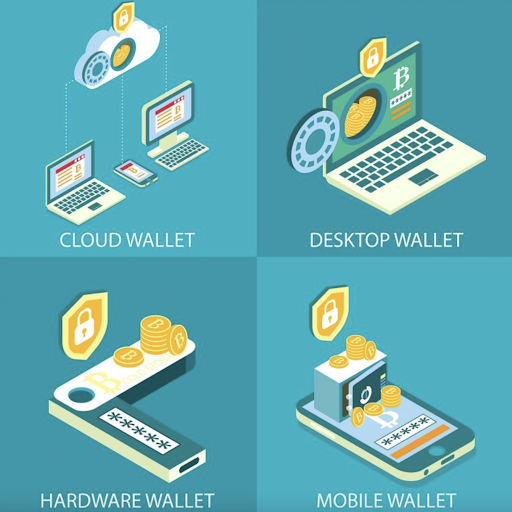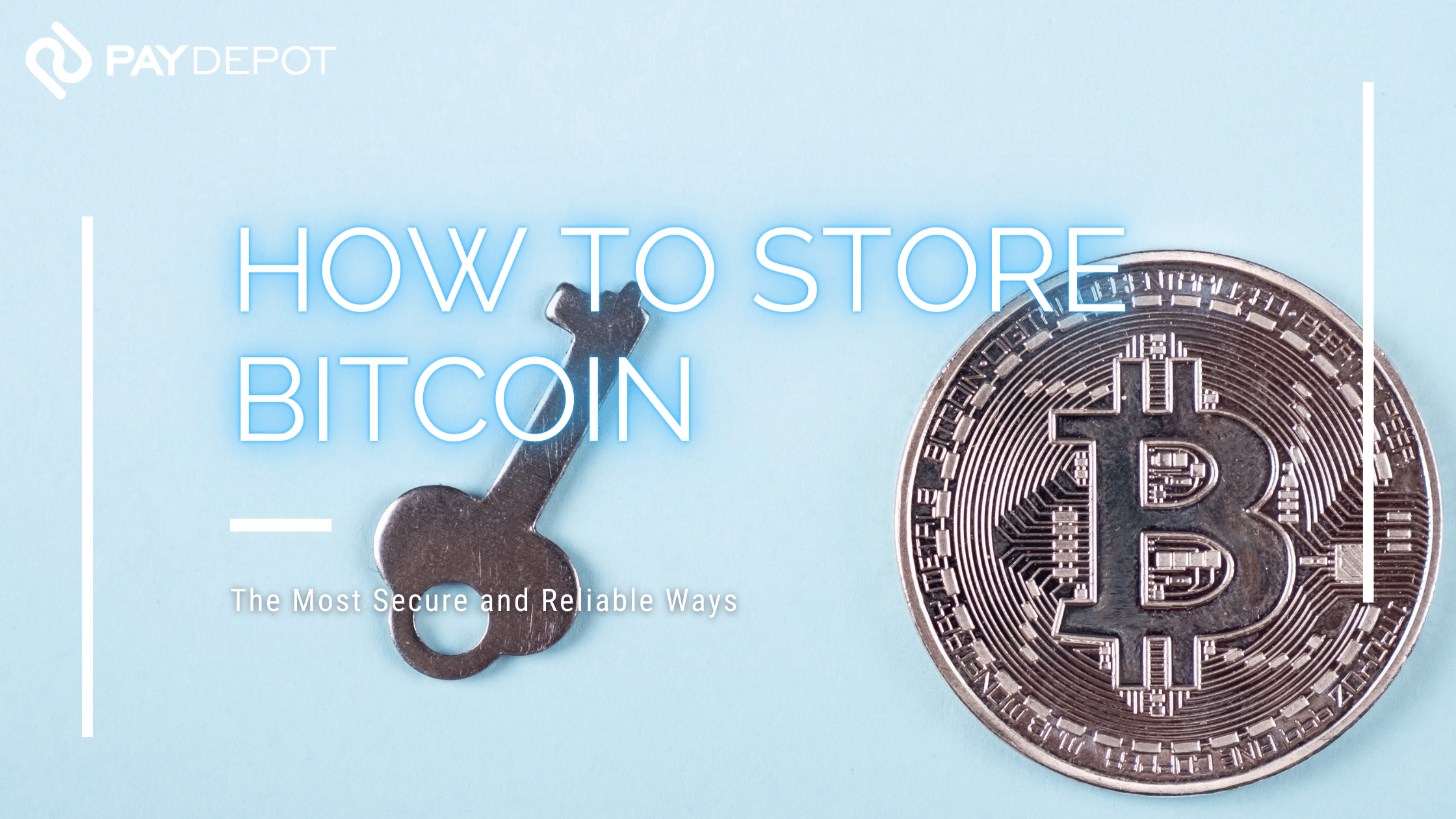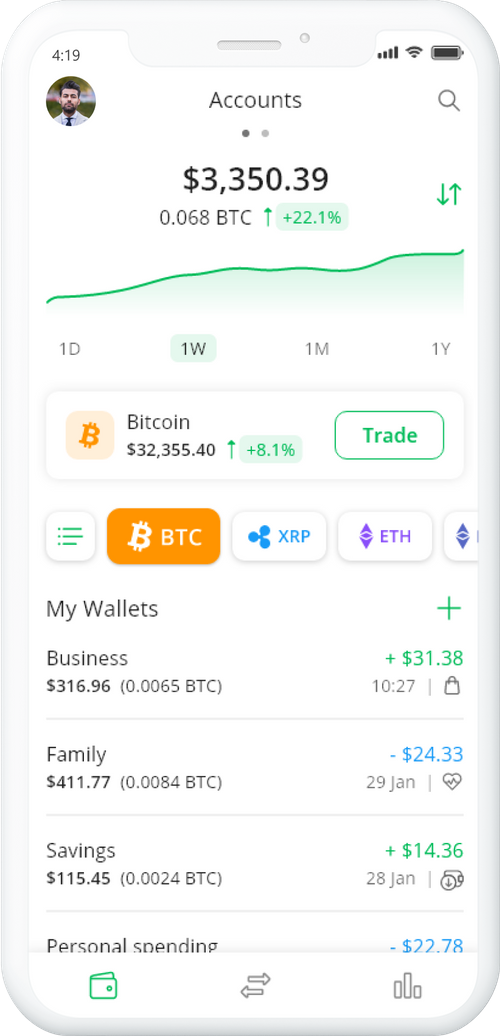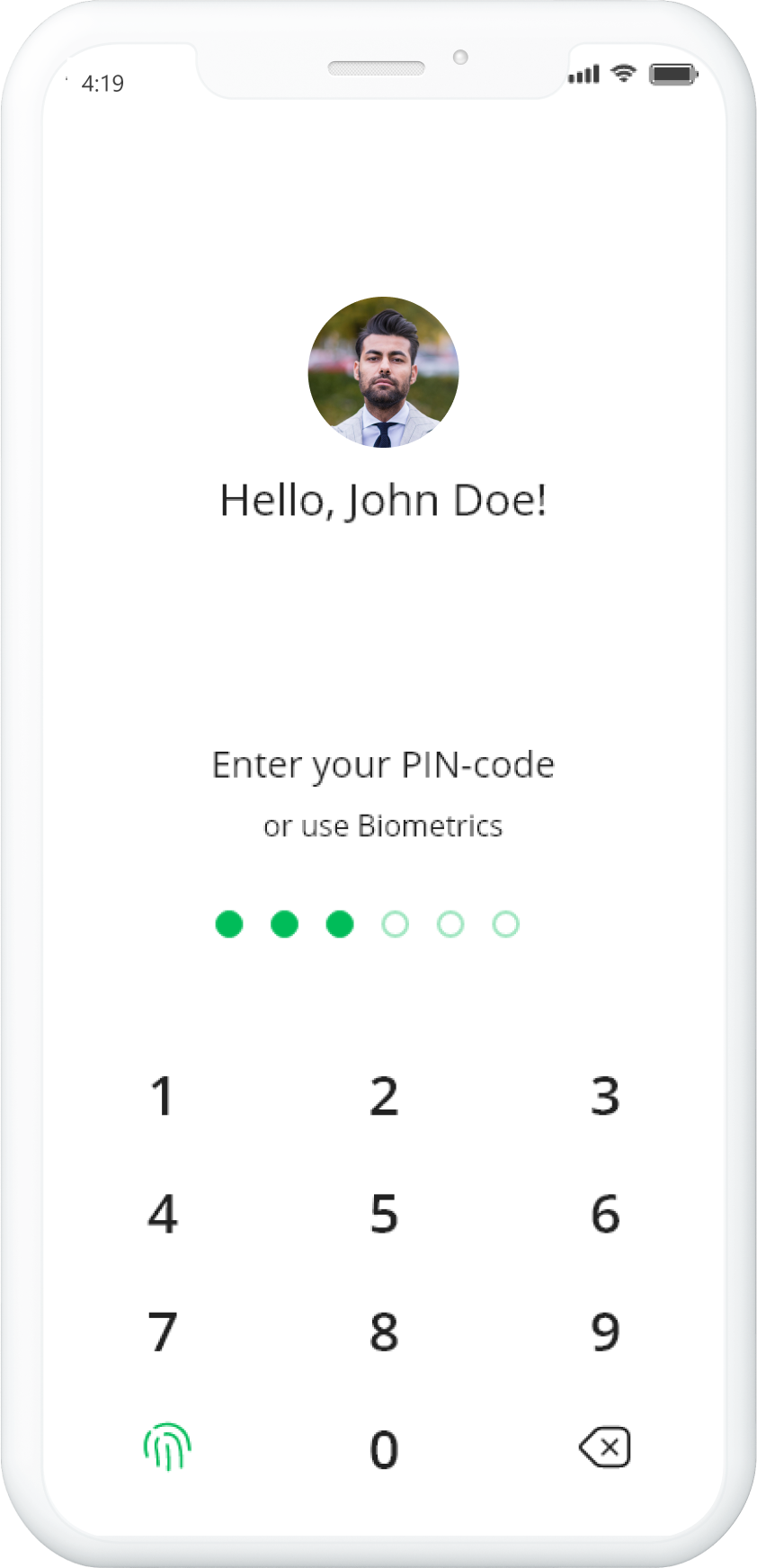Bitcoin is the most successful cryptocurrency to date, but it's not without risk. As the number of users who purchase cryptocurrency increases, so does the number of hacking events that have occurred as well. In addition, since there are many new investors in the crypto field who are unsure how to store their crypto properly, hackers are taking advantage of this to steal funds.
Storing Bitcoins in a digital wallet is one of the easiest ways to protect your investment and ensure that no one else can access your crypto. However, which is the right wallet for you? Which one is the safest, and which should you stay away from? In this article, we'll discuss the best methods for storing Bitcoin, including hardware wallets, offline storage, paper wallets, and exchange-based storage.
What Is a Cryptocurrency Wallet?
A cryptocurrency wallet is an electronic wallet that can only be accessed using a private key. It also helps you send and receive Bitcoin, as well as view any pending transactions. Anonymously purchasing Bitcoin without a proper wallet would be difficult since these cryptocurrencies are not controlled by a bank or any other regulated entity. The lack of regulation makes it difficult to track how much Bitcoin is earned, spent, and stolen if you're not using a cryptocurrency wallet.
In order to protect yourself and authorize any purchases or trades, you'll want to use a cryptocurrency wallet that requires the use of a private key in order to access the wallet. Remember, when using any of the wallets on this list, we recommend that you never share your private key with anyone else.
Bitcoin Storage Types
There are two main storage types that you can choose when it comes to how you want to store your Bitcoin, including third-party custodians and local storage. In this section, we'll discuss the differences between the two and also what each of them offers.
Third-Party Custodians
Third-party custodians refer to wallets that store your Bitcoin off of the device you choose to use. Usually, this means that a company, referred to as a third-party, offers a way for users to store their cryptocurrencies in an online wallet or a vault. This is similar to how a bank functions, which is why cryptocurrency was created in the first point, to remove the involvement of third parties.
The advantages of choosing this type of wallet include:
- Ensures you don't lose access to your funds, even if you misplace your key.
- Provides stronger security than your computer.
- Necessary if you want to make trades on popular cryptocurrency exchanges.
- May offer perks such as a return on your savings or a way for you to stake your Bitcoin.
The disadvantages of choosing this type of wallet include:
- You're allowing someone else to hold your crypto, which means they could take it without you knowing.
- You don't own private keys, which means you're trusting the security of another platform.
- Might not have access to new cryptocurrencies, depending on what's offered through the wallet.
- Functions similarly to a bank.
Local Storage (Self-Storage)
Local storage wallets are the most common type of cryptocurrency wallet that many people choose when it comes to storing Bitcoin. These wallets include software that can be downloaded onto your computer or mobile device, and they're what you'll use in order to make trades on popular cryptocurrency exchanges such as Coinbase. Unlike third-party custodians, you'll own your own keys, meaning that no other person or software can make an exchange for you.
The advantages of choosing this type of wallet include:
- Allows you complete control of your Bitcoin, making it harder for others to steal.
- Offers you multiple levels of security.
- Restricts who can view your transactions.
The disadvantages of choosing this type of wallet include:
- Could lead to increased error, resulting in loss of funds.
- Harder to trade.
- Will lose security benefits that a third-party platform can offer.
Bitcoin Wallet Types

Now that you understand the two different storage types, it's essential to know which ones are available. There is a plethora of options to choose from when it comes to storing your Bitcoin, including:
Hot Wallets
A hot wallet is a cryptocurrency wallet that's connected to the internet, allowing you to make trades and complete purchases over a cryptocurrency network. This means it'll be easier for you to store your Bitcoin and send or receive funds from others as well as alternative cryptocurrencies. In addition, you can access your crypto via private or public keys that help to act as a security measure and facilitate transactions.
The main drawback of using a hot wallet is that it doesn't offer as much security as other wallets since it's always connected to the internet. The most popular types of hot wallets include Coinbase Wallet and MetaMask. Before choosing a hot wallet, you'll want to thoroughly research each one to ensure it fits your needs.
Cold Wallets (Offline)
Cold Wallets are cryptocurrency wallets that aren't connected to the internet and usually store your Bitcoin offline, ensuring that it's protected from malicious third parties. You can access your digital currency through a piece of hardware or a wallet application you install on your computer.
The main advantage of choosing a cold wallet is the security benefits of using it instead of other types of wallets. Since it's not connected to the internet and stores your keys on an offline network, it's harder for hackers to steal your funds. The main drawback of using a cold wallet is that it might be too difficult for novice users to access or trade their cryptocurrency.
Bitcoin Software Wallets
If you've chosen a software wallet for your Bitcoin, you'll be provided with a crypto address where you can store your Bitcoin. You'll control the keys to this wallet and will need both of them in order to withdraw funds to spend or send it to other wallets. If you're considering a software wallet to store your cryptocurrency, these options are worth exploring:
Web-based (exchange wallets)
Web-based wallets are software wallets that are hosted by cryptocurrency exchanges, such as Coinbase. If you choose this option, the wallet will be provided for you by your exchange when you sign up to use their services. While you'll still have a private key available to access your wallet, this is considered less secure than other options because it's always running on an internet connection, which is why they're considered less secure than other options.
Desktop
Desktop wallets are wallets that you can download to your computer. It works by connecting to the internet and downloading it, after which you'll need to store the file on a device with offline access (like a USB). If you choose this option, make sure it's compatible with your operating system. The advantage of choosing a desktop wallet is that it's more secure than other options since it's not connected to the internet. This makes it less prone to hackers and more secure than other wallets.
Mobile
Like desktop wallets, you download wallet apps to your phone or other mobile devices with mobile wallets. These are great for people who frequently use their phones for trades or purchases while on the go. The most significant benefit is that you'll have easy access to your funds at all times. However, while they're more convenient than desktop wallets and safer than online wallets, they're still prone to the same security risks as the other options.
Bitcoin Hardware Wallets
A Bitcoin Hardware wallet is a piece of hardware designed specifically to store your Bitcoin and private key information, which is needed to do anything with your Bitcoin. They typically work with a device, generally using USB drives in order to store these keys, which makes it difficult for anyone else to access your information.
The main benefit of choosing this option is the security it offers over other wallets, as well as the back-up recovery phrase that these devices use to access your Bitcoin even if the private key was stolen. The downside is that they can only be used with desktop devices and are more challenging to use than software wallets since they require the installation of specialized apps on the computer before you'll have access to your funds.
Paper Wallets
A Bitcoin paper wallet is a place to store your private key information on paper, which is typically done using two QR codes. The main benefit of using this option is the security it offers over other wallets since the only people who can access it are those who have access to the piece of paper with your wallet information. In addition, when you choose this option, your cryptocurrency is generally removed from your network and digital wallet.
While paper wallets are considered one of the safest ways to store your cryptocurrency, they are not the most commonly used cryptocurrency wallets because they can be misplaced, degrade over time, become damaged due to environmental factors, or be damaged in some other way. Plus, if you don't use a secure network while printing out your wallet or forget to disconnect from the internet during this period of time, your wallet can become susceptible to hackers.
On the other hand, when this process is performed correctly, printed out, and stored in a safe place such as a lockbox, it can become one of the most secure options available.
Physical coins
Physical coins are similar to paper wallets, but you can hold them in your hand, and the only information on the coin is a private key. These are more secure than paper wallets since they're not connected to any network or device that could be hacked into.
The downside of using these is that they only work with one cryptocurrency, so if you want to use another digital wallet at some point, you'll need another physical coin for each new wallet. Most people don't opt for this method because it's less convenient and can easily get lost or misplaced compared to its digital alternatives. Plus, it acts similarly to fiat currency which goes against the whole idea of cryptocurrency in the first place.
How to Choose a Proper Wallet Type

When choosing a wallet, there are a few factors you want to consider in order to select the right option for you, including:
Security of the Wallet
The most important thing to look for in your cryptocurrency wallet is security. You need to ensure that your wallet's private key won't be accessible by anyone but you if you want to keep it secure.
If you're not sure what kind of wallet will provide this type of security, opt for more secure options such as physical hardware wallets or paper wallets since they require additional steps in order to access your funds. Some of these actions will disconnect your device from the internet so no one can get into your account without knowing the location of the private key and having direct access to your hardware devices at all times.
Price Point of the Wallet
Another factor to consider is the price point of the different cryptocurrency wallets. Some wallets are free while others charge a small fee for their services that you'll need to pay in order to utilize them.
If you're looking for an option with lower cost and good security, opt for paper wallets since they don't require any payment and can be very secure if they were created through a secure network. On the other hand, if you're looking for something with good security and better ease of use, opt for hardware wallets since they have a small fee but are still relatively secure.
Convenience of the Wallet
You also need to consider how convenient each wallet is to use. Depending on the wallet you choose, it might be challenging in order to access your Bitcoin, making it harder to trade or sell Bitcoin as needed. If you want an option that's easy to access and won't require you to pay for additional security measures, opt for a digital wallet.
On the other hand, if you want an option that is more secure and can be backed up in case of damage or loss, opt for a physical hardware wallet.
The Amount of Crypto You Need to Store
Lastly, you want to consider how much cryptocurrency you need to store. If you have a lot of crypto, opt for a hardware wallet since it's more secure and will keep your funds safer. On the other hand, opt for a digital wallet if you're looking for an option that can easily be carried on a flash drive or external device.
What Is the Safest Way to Store Bitcoin?
Once you've decided on the right wallet, you'll want to ensure you protect your cryptocurrency by following these steps:
Create a Strong Password
When creating a password for your wallet, make sure it's difficult to guess and only accessible by you. This will protect you from hackers who might try to access your private key in order to steal your cryptocurrency. In addition, strong passwords should include a combination of letters, numbers, and symbols, as well as unique cases for each letter to make it even more challenging to guess.
Back Up Your Wallet
After creating a strong password for your wallet, back it up by storing the private key on an external device that isn't connected to the internet. This will ensure that no one can access your funds without knowing the password and having access to your device at all times.
Protect Your Password and Private Key
Make sure you're storing your password and private key on a secure, offline device so no one can access it without knowing the password or having direct access to your hardware. If you lose or damage this information, there is no way to recover it, so protecting it is essential to keeping your funds safe and secure.
Use Malware Protection
Ensure your device is protected by anti-malware software that will keep it safe from hackers. If a hacker does get into your system, malware protection will protect you and restore your data, so you can try to enter your password again without losing access to your account.
Key Takeaways
It can seem challenging to figure out the best way to store your Bitcoin. However, with a bit of research and a lot of patience, you should be able to figure it out.
Remember that the best way to store your Bitcoin is by choosing a wallet that offers high security, good ease of use, and a reasonable price point for your budget. Make sure you follow these security guidelines as well as general safety measures to protect yourself from hackers who might try to access your funds.
Once you've chosen your wallet, start purchasing your cryptocurrency online or find a Bitcoin ATM near you to get started!
FAQ
Is It Safe to Keep Crypto on Coinbase and Other Exchanges?
It's generally considered safe to keep cryptocurrency on exchanges, provided you properly secure your login details. This means you'll need to make sure that no one can access your account without your password token. Also, make sure to never disclose your private keys or passwords with others to ensure they don't get hacked by malicious third parties.
How to Store Bitcoin on USB?
You'll need to use a flash drive and download the wallet software from a reputable cryptocurrency website. Make sure to research the right USB drive to ensure you choose the right size and type.
Is a Cold Bitcoin Wallet Safe?
Yes, as long as it's properly encrypted and was created offline. As this type of wallet is typically more secure than online or desktop wallets, make sure to use a strong password and avoid entering your login details on any computer you suspect could be compromised.



